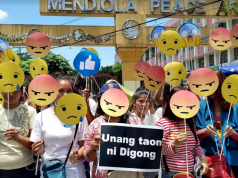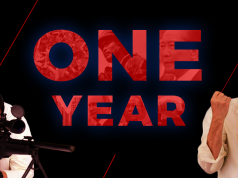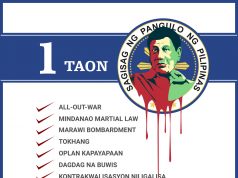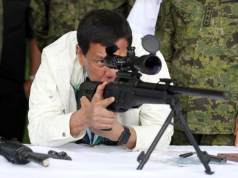MANILA, Philippines – Critics of the so-called Yellowtards get angry at them because detractors claim that Dilawans have nothing good to say about President Rodrigo Duterte and his administration.
The so-called Dutertards, meanwhile, are also plagued by criticisms because they supposedly do nothing but defend the chief executive and agree to everything that Duterte does and says.
But life isn’t black and white and individuals, including the country’s most powerful person, can’t be judged as either completely good or bad.
Thus in his recent assessment of Duterte’s first year in office, political analyst Antonio “Tony” La Viña, former dean of the Ateneo School of Government (ASoG), listed both the good and the bad about the President and his administration’s performance and also the uncertain about the government’s practices and policy direction.
“It’s a very different Philippines from a year ago. And it’s both good and bad,” said La Viña, former undersecretary of the Department of Environment and Natural Resources.
He was quick to add that some of the bad points that he had enumerated were not necessarily Duterte’s fault as some issues were an accumulation of problems that the chief executive inherited from past administrations.
He also urged Filipinos to see both the good and bad about Duterte and avoid having a distorted view of the issues concerning the performance of his one-year-old administration.
“When there’s something bad, we oppose it, we correct it,” he said. “If there’s something good, we should support that.”
The good
La Viña said the two most important decisions that Duterte had made were the appointment of Nestor Espenilla Jr. as Bangko Sentral ng Pilipinas governor and the abandonment of the government-to-government (G2G) rice importation.
Espenilla is the right man for the job because he has no political connections that could affect or tarnish his reputation as a public servant, according to La Viña.
“That’s the most important decision because it’s about currency, it’s about interest rates, and it’s about the macro economy. And if we’re going to be in good hands, regardless of what happens externally, the economy will move,” he added.
As for the shift in the government’s rice policy, the former ASoG dean lauded Cabinet Secretary Leoncio “Jun” Evasco Jr. for pushing to change the scheme from G2G to government-to-private (G2P) amid conflicts among officials of the National Food Authority (NFA).
“Economists tell me that if this is done right and is consistent, this is the best thing that will happen to food prices in the Philippines in the next months to come,” La Viña said.
Also, La Viña praised Duterte’s appointment of leftist and progressive leaders in his Cabinet such as Agrarian Reform Secretary Rafael Mariano and Social Welfare Secretary Judy Taguiwalo.
“They’re actually taking the sides of the constituents from which they were created,” he said.
However, La Viña thinks that the administration, through the Department of Labor and Employment headed by Silvestre Bello III, is not yet effective in its approach to ending job contractualization, which is among Duterte’s key campaign promises.
La Viña also regarded tax reform, the ‘Build, Build, Build’ infrastructure plan, peace talks with the Moro groups and the Reds, and the continuation of past government reforms, such as the K-12 education and the Reproductive Health Law (despite some problems), as among the positive actions of the one-year-old Duterte administration.
The bad
La Viña criticized Duterte’s handling of the Marawi crisis.
He said Duterte’s linking of terrorism and drugs was not new, citing studies in Mindanao about the relationship between the two by scholar Francisco “Pancho” Lara, country manager of International Alert UK in the Philippines.
La Viña also warned against conflating drugs and terrorism, especially if the Marawi siege would be treated as a drug problem more than an issue about religious extremism.
He said government should instead address religious extremism directly.
”The real opium here is not the shabu that they might be taking. It’s really the promise of martyrdom for the jihadists,” said La Viña.
He also warned against the President’s recent statement to carpet-bomb Marawi to save soldiers clashing with Islamist extremists led by the Maute and Abu Sayyaf groups.
“If you actually do that, that’s your guarantee it (terrorism) spreads. The nature of these terrorists is that they can go from one place to another. It doesn’t matter how many you kill of them,” La Viña said.
He also reiterated his stand that even though martial law was justified in Marawi City, it was not justified in the whole of Mindanao.
It was also a “big disservice” for Congress to not convene after military rule was imposed in the South, according to La Viña.
Moreover, he said the alleged abuse of power by the legislative branch as among the bad points in the first year of the Duterte administration.
He said he was appalled at how Congress had dealt with several issues, such as the extrajudicial killings at the Senate, the case of Senator Leila De Lima and her driver Ronnie Dayan at the lower chamber, the railroaded dismissal of the impeachment complaint against Duterte, the rejection of Gina Lopez as Environment Secretary, and the conflict between two officials from Ilocos Norte, Governor Imee Marcos and House Majority Floor Leader Rodolfo Fariñas.
The impunity in the war on illegal drugs will also hunt the country for decades, according to La Viña, as the administration’s approach has violated the basic norms of human rights and human dignity.
He said among the risks the country could face from the war on drugs are the country’s standing at the United Nations and its trade and aid relations with the European Union.
He also said there was a strong likelihood that the complaint filed at the International Criminal Court against the President would prosper. But La Viña said that if the case progresses, it would indicate that there’s a failure in the country’s accountability system.
Other “bad points” mentioned by La Viña are the administration’s allegedly confusing execution of the country’s independent foreign policy; problems in the justice system highlighted by the killing of suspected drug lord and Albuera, Leyte Mayor Rolando Espinosa inside his detention cell allegedly by authorities led by Police Supt. Marvin Marcos; high-level corruption in the government, and the distrust and the distrust and hatred among political partisans.
‘Mother of all uncertainties’
Meanwhile, La Viña’ considers the President’s health as “the mother of all uncertainties.”
“I will not speculate…From a point of exposure, I think the President is overexposed and should be more circumspect about his schedule given his age,” he said
In any case, he said the Constitution is clear about succession.
Among the things that La Viña thinks is doubtful or uncertain about the administration is Duterte’s presidential style based on his longtime experience as a mayor.
He said the President’s current style of leading the nation from leading a city in Mindanao is either criticized as incompetent or regarded as practical because of his ability to directly engage with people.
He also listed the following as among the uncertain points about the administration: the military appointees in the Cabinet; the leadership of the DENR without Lopez; plans on climate change and disaster risk reduction; confirmation of DSWD’s Taguiwalo, DOH’s Paulyn Ubial, and DAR’s Mariano; future appointments of Supreme Court justices; the election protest of former senator Ferdinand “Bongbong” Marcos Jr. against Vice President Leni Robredo; and the traffic and the mobility crisis.
Below is the summary of what’s bad, good, and uncertain about the Duterte administration’s year one performance, according to La Viña:
DUTERTE YEAR ONE | The good, the bad, and the uncertain by arsabangan








